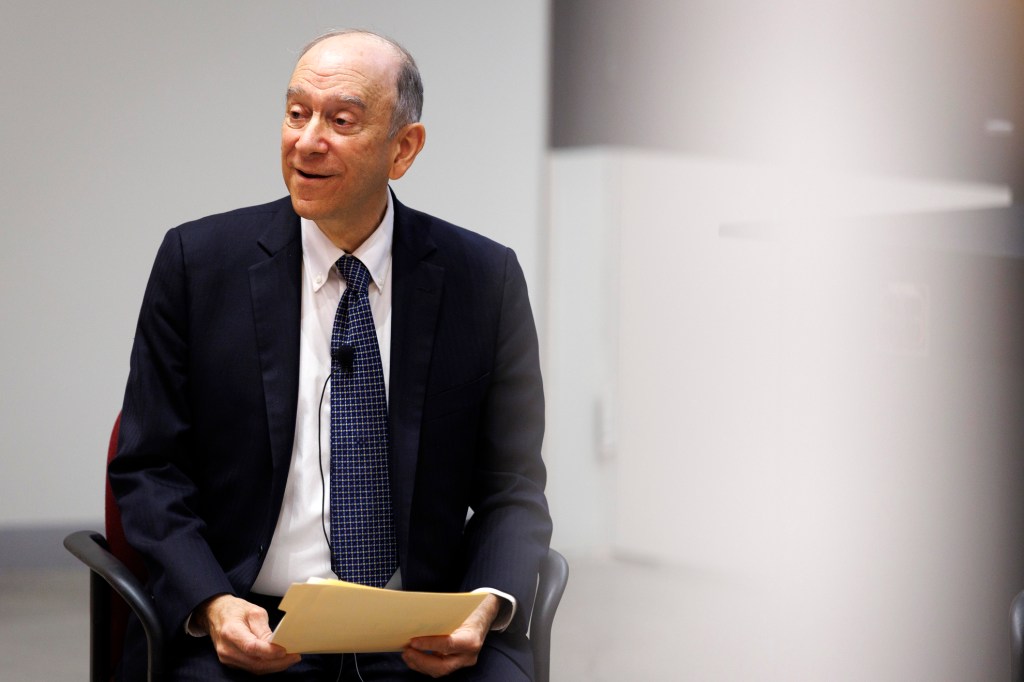Terry Murphy 2025-04-08 16:46:00 news.harvard.edu
The late Supreme Court Justice Antonin Scalia made the bench “hot.”
Noel Francisco said lawyers used to be able to present arguments at their own pace before facing justices’ questions. But “Scalia changed that dynamic because he was the first one who was an active questioner.” Since then, other justices have taken up Scalia’s style, leaving lawyers less opportunity to shape the exchange.
Francisco should know, having worked on both sides of the bench. He clerked for Scalia from 1997 to 1998 and later served as U.S. solicitor general during the first Trump administration, arguing cases before the Supreme Court on the government’s behalf.
Last Friday, Francisco was joined by Elizabeth Prelogar, J.D. ’08, and Neal Katyal, who served as solicitors general during the Biden and Obama administrations, respectively. During a conversation with Richard Lazarus, the Charles Stebbins Fairchild Professor of Law, the three offered an insider’s look at the job and how it has changed since 2017 with the addition of four new justices.

Changes to the court’s composition over the last two decades have affected the tone and the dynamic between the justices and advocates, and between the justices themselves, the trio noted.
There can be a “learning curve” for everyone, even the other justices, whenever a new justice gets seated, they noted. Sometimes, even a single justice, like the influential conservative Scalia or centrist Anthony Kennedy, often a “swing” vote, can have an impact on how lawyers argue cases.
Recalling one of his first appearances before the court, Katyal said Justice Sandra Day O’Connor “cared a lot about the facts of the case.” But after she stepped down, factual questions became “just one part” of the court dynamic at oral argument until Justice Sonia Sotomayor’s arrival in 2009.
The justices typically “didn’t have their minds made up as often as I feel like they do now,” Katyal said. Kennedy, in particular, “really didn’t know what he was going to do at the time of oral arguments in a lot of the big cases,” which gave the lawyers on both sides a greater opportunity to persuade the court.
Prelogar credits Justice Amy Coney Barrett, a former law school professor, with asking some of the toughest questions.
“She has this incredible ability to go multiple layers deep in unpacking an issue, always in a very fair way, a way that’s totally within bounds, and a way that’s very driven by a genuine desire to fully understand the ramifications of the government’s position in a particular case,” said Prelogar.
Kagan, the former HLS dean, is by far the toughest, say Francisco and Katyal, because she “dissects your case” and tests the very outer limits of one’s argument.
No question, they said, it can be terrifying, especially the first few cases before the court.
Francisco recalled referring to Justice Ruth Bader Ginsburg as Justice O’Connor, to gales of laughter from the gallery. They each sought advice from experienced colleagues or trusted law professors on how to manage their nerves and use their time at the podium wisely.
Katyal credited Lazarus’ counsel to get past his anxiety early in the job by viewing the back-and-forth with the justices at oral argument not as a battle to be won, but as a collaboration of ideas.
Win or lose, whatever you do, remember who the client is and don’t say something you later have to walk back.
“When you represent the United States and you’re standing at the podium in the Supreme Court, you’re committing the United States to a particular view of the law. You’re speaking this with the authority of the federal government, and you have to take some care, not ad hoc, making determination about what the positions of the United States will be,” Prelogar said.
Source Link
 Keep track of your essentials with the Apple AirTag 4 Pack, the ultimate tracking solution for your belongings. With over 5,972 ratings and a stellar 4.7-star average, this product has quickly become a customer favorite. Over 10,000 units were purchased in the past month, solidifying its status as a highly rated Amazon Choice product.
For just $79.98, you can enjoy peace of mind knowing your items are always within reach. Order now for only $79.98 at Amazon!
Keep track of your essentials with the Apple AirTag 4 Pack, the ultimate tracking solution for your belongings. With over 5,972 ratings and a stellar 4.7-star average, this product has quickly become a customer favorite. Over 10,000 units were purchased in the past month, solidifying its status as a highly rated Amazon Choice product.
For just $79.98, you can enjoy peace of mind knowing your items are always within reach. Order now for only $79.98 at Amazon!
Help Power Techcratic’s Future – Scan To Support
If Techcratic’s content and insights have helped you, consider giving back by supporting the platform with crypto. Every contribution makes a difference, whether it’s for high-quality content, server maintenance, or future updates. Techcratic is constantly evolving, and your support helps drive that progress. As a solo operator who wears all the hats, creating content, managing the tech, and running the site, your support allows me to stay focused on delivering valuable resources. Your support keeps everything running smoothly and enables me to continue creating the content you love. I’m deeply grateful for your support, it truly means the world to me! Thank you!|
BITCOIN 

bc1qlszw7elx2qahjwvaryh0tkgg8y68enw30gpvge Scan the QR code with your crypto wallet app |
|
DOGECOIN 

D64GwvvYQxFXYyan3oQCrmWfidf6T3JpBA Scan the QR code with your crypto wallet app |
|
ETHEREUM 

0xe9BC980DF3d985730dA827996B43E4A62CCBAA7a Scan the QR code with your crypto wallet app |











































































![BASENOR 3PCS Tesla Model Y Model 3 Center Console Organizer [Carbon Fiber Edition]…](https://techcratic.com/wp-content/uploads/2025/08/71R5dfCR9FL._AC_SL1500_-360x180.jpg)






















